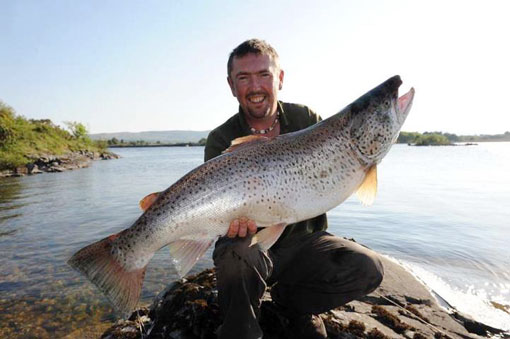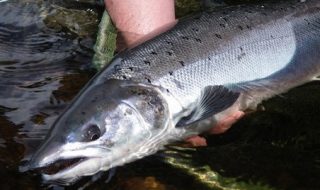Ireland’s Lough Corrib has produced a giant of a Ferox trout to Welsh angler Ceri Jones – this 23lb 12oz beast.
The fish, the biggest Ferox ever officially weighed at west of Ireland venue, caps a long term ambition for Ceri, who has fished the water numerous times in search of a fish over the magical 20lb barrier.
The trout, thought to be 12 years old and towards the end of its predicted lifespan, took a rudd deadbait trolled close to Inchagoill Island.
Kevin Crowley of Inland Fisheries Ireland said: “The fish was officially weighed on certified scales, and once ratified, will be the largest officially verified trout from Lough Corrib.
“Although several fish in and around 25lb have been caught and released in recent years, they were not weighed on certified scales and cannot count for record purposes. With such massive fish coming off the lake, it is surely only a matter of time before the Irish trout record of 26lb 2oz, set in 1884, is broken on Corrib.”
Although stocks of brown trout appear to have declined on 43km long Lough Corrib, that cannot be said for the Ferox population. Fisheries experts have implemented measures to protect the species’ spawning grounds throughout the month of September, and a catch limit of one fish over 10lb per day has been enforced.
“We don’t require fly anglers, or any anglers, to return their fish on Corrib – there is a catch limit and size limit and we ask anglers to respect their quarry, stay within the limits, and only take what they need,” added Kevin. “We do encourage catch-and-release of Ferox trout, as the population is not huge, and most anglers are happy to observe this. However, there is no legal requirement to release big fish.
“If enough people requested a further change in bye-laws to require catch-and-release of Ferox trout that is something we would look at,” he added. “There is some scientific evidence that these really old, big fish are not very fertile – ‘menopausal’ perhaps – and that their contribution to spawning is much reduced. This fish has probably contributed handsomely to the gene pool already.”






